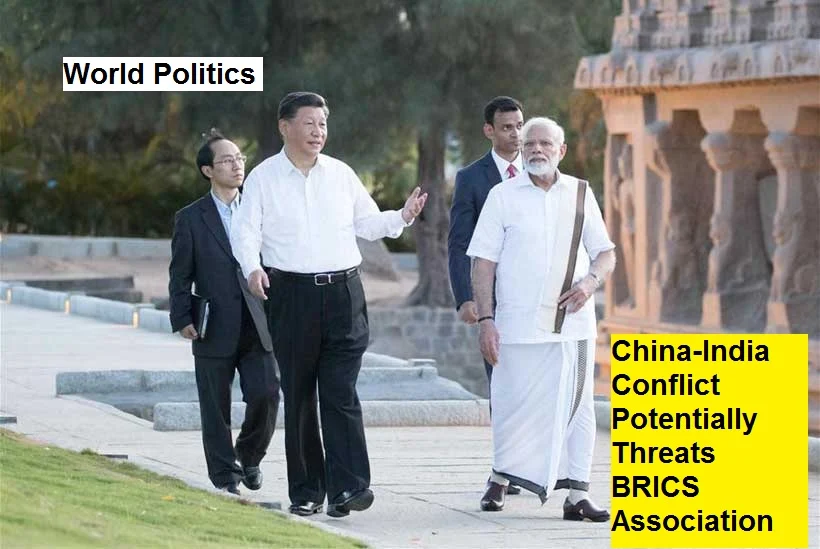The article published in Modern Diplomacy relating to the topic explains that the ongoing tensions between China and India are not just a bilateral issue but also a potential threat to the BRICS association, which comprises Brazil, Russia, India, China, and South Africa. These major emerging economies are facing challenges as they seek to expand their global influence.
The conflict between China and India has escalated recently, particularly in the Galwan Valley along the Line of Actual Control (LAC), a border established after the 1962 war between the two countries. This conflict has raised concerns about the unity and functioning of BRICS.
Punsara Amarasinghe, a PhD candidate in international law, highlights the irony of this tension given the historical similarities and shared values between China and India, both of which were once victims of Western colonialism.
Likewise, India's first Prime Minister, Jawaharlal Nehru, initially sought a close relationship with Communist China, envisioning a joint effort against Western imperialism. However, territorial disputes, especially regarding Arunachal Pradesh and Aksai Chin, led to the Sino-Indian War in 1962.
Apart from the current border conflict, other issues affecting China-India relations include China's growing influence in South Asia, India's concerns about it, nuclear strategies, and India's ties with the USA.
Amarasinghe emphasizes that the historical trajectory of the India-China conflict has always been about power and global governance aspirations. Despite a 1996 pact prohibiting the use of firearms in border disputes, incidents of aggression have occurred.
China's Foreign Ministry has proposed measures to de-escalate tensions and prevent future armed conflicts, focusing on implementing previous agreements and addressing border issues.
The rivalry between China and India has broader implications, especially for the South Asian region and potentially for the cohesion of BRICS. Discussions by experts like Dr. Zhu Ming and Tahama Asadis highlight the complexities of geopolitical alliances and changing power dynamics.
China's successful influence in South Asia is attributed to its 'Good Neighbour Policy' and increased diplomatic and economic engagements in the region, aiming to enhance its strategic position.
Concerns over BRICS
Professor Ian Taylor raises doubts about the long-term coherence of BRICS, citing the China-India rivalry and differing priorities among member countries.
Originally comprising Brazil, Russia, India, and China, BRIC was expanded to BRICS with South Africa's inclusion in 2010. However, concerns exist about China's dominant role within the group and its impact on the alliance's effectiveness.
Zhu Ming expresses cautious optimism about BRICS' future, noting Beijing's measured approach to the China-India conflict and the limited strategic value of the disputed territory.
The BRICS group, while seen as a geopolitical rival to the G7 bloc, faces challenges in maintaining unity and achieving its strategic goals. BRICS has strategic partnerships in policy, economy, and culture, with ongoing efforts to expand its membership and transform into a more influential global coalition.
The upcoming BRICS summit in Kazan is expected to showcase the group's geopolitical influence and promote cooperation on key issues. BRICS has received both praise and criticism from various quarters, with debates about its effectiveness and impact continuing among experts and analysts.
The origins of BRICS can be traced back to a 2001 publication by Jim O'Neill, highlighting the potential of Brazil, Russia, India, and China in the global economy. With the inclusion of new members like Egypt, Ethiopia, Iran, and the United Arab Emirates, BRICS represents a significant portion of the world's population and economic strength.
The association has faced challenges in maintaining cohesion and addressing the diverse interests of its member countries. Efforts to expand BRICS and enhance its influence on the global stage continue, with discussions on key issues such as economic cooperation, security, and cultural exchange.
BRICS Principles of Policy
BRICS operates on principles of non-interference and equality among members, aiming to ensure mutual economic benefits and promote a multipolar world order.
Despite internal challenges and external pressures, BRICS remains a platform for emerging powers to engage in meaningful dialogue and cooperation.
The association's role in shaping global governance and addressing key challenges like climate change and economic inequality is still evolving, with ongoing discussions and initiatives.
In conclusion,
the China-India conflict underscores the complexities and challenges facing not
just these two countries but also broader regional and global dynamics,
including the future of BRICS as a significant international alliance.

Post a Comment
0Comments